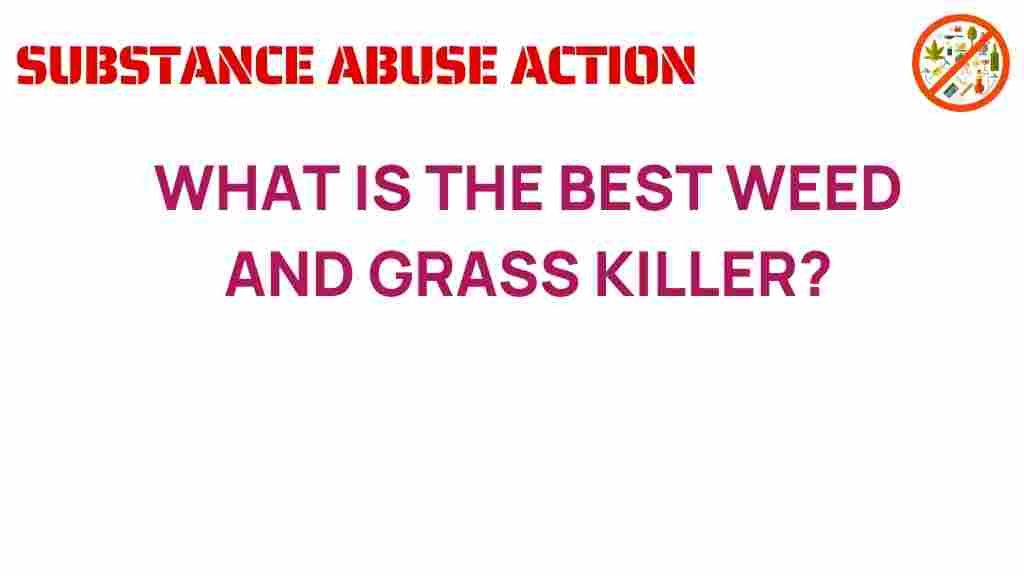Unveiling the Secrets: What is the Best Weed and Grass Killer?
Maintaining a beautiful garden or lawn is a labor of love for many homeowners and gardening enthusiasts. However, one of the biggest challenges in lawn care is dealing with unwanted weeds and grasses that can ruin the aesthetic appeal of your outdoor space. In this article, we will explore the best weed and grass killers available on the market, discuss eco-friendly options, and provide valuable gardening tips for effective garden maintenance.
Understanding Weed and Grass Killers
Weed and grass killers, commonly referred to as herbicides, are chemical or natural solutions designed to eliminate unwanted plants without harming the surrounding environment. They come in various formulations, including:
- Selective Herbicides: Target specific weeds while leaving desirable grasses unharmed.
- Non-selective Herbicides: Kill all plants in the treated area, making them suitable for clearing entire sections.
- Pre-emergent Herbicides: Prevent weed seeds from germinating.
- Post-emergent Herbicides: Effective on weeds that have already sprouted.
Choosing the Right Weed and Grass Killer
When selecting the best weed and grass killer for your lawn care needs, consider the following factors:
- Type of Weeds: Identify whether you are dealing with broadleaf weeds, grasses, or both.
- Application Area: Determine if you need a selective or non-selective herbicide based on your garden’s layout.
- Environmental Impact: Look for eco-friendly options that minimize harm to beneficial insects and soil health.
- Safety and Toxicity: Check for any health risks associated with the herbicide you choose.
Top Weed and Grass Killers on the Market
Here’s a list of some of the best weed and grass killers to consider for your lawn care routine:
- Roundup: A widely known non-selective herbicide that is effective in killing a broad range of weeds and grasses.
- Ortho Weed B Gon: A selective herbicide that targets broadleaf weeds while protecting your grass.
- Natural Armor: An eco-friendly option that uses plant-based ingredients to combat weeds.
- Preen Garden Weed Preventer: A pre-emergent herbicide that stops weeds before they sprout, ideal for flower beds and vegetable gardens.
Step-by-Step Guide to Using Weed and Grass Killers
To effectively use weed and grass killers in your garden maintenance routine, follow these steps:
- Identify the Weeds: Before applying any product, make sure you know the types of weeds you are dealing with.
- Choose the Right Product: Select a herbicide that suits your specific needs, considering whether you require a selective or non-selective solution.
- Read the Instructions: Always read the manufacturer’s instructions for safe and effective application.
- Prepare the Area: Mow your lawn to the recommended height and remove debris before application.
- Apply the Herbicide: Use a sprayer or spreader to evenly apply the product, ensuring you follow the recommended dosage.
- Monitor the Area: Keep an eye on the treated area for several days to observe results and ensure the product is working effectively.
- Reapply if Necessary: Some weeds may require a second application, especially if they are particularly stubborn.
Eco-Friendly Alternatives to Traditional Herbicides
For those concerned about the environmental impact of conventional herbicides, several eco-friendly alternatives can help maintain your garden:
- Vinegar: A natural herbicide that can kill weeds due to its acetic acid content. Suitable for small areas.
- Boiling Water: Pouring boiling water on weeds can effectively kill them without chemicals.
- Salt: Salt can be an effective weed killer but should be used cautiously as it can also harm surrounding plants.
- Mulching: A great way to suppress weed growth while enriching the soil.
Pest Control and Weed Management
Effective pest control is an essential aspect of overall lawn care. Weeds often attract pests, and tackling them can help minimize pest issues in your garden. Here are some gardening tips to integrate pest control with weed management:
- Healthy Soil: Maintain soil health to promote strong plants that can better resist pests.
- Companion Planting: Some plants can repel pests naturally and may help reduce weed proliferation.
- Regular Maintenance: Regularly check your garden for weeds and pests, addressing issues promptly to prevent escalation.
Troubleshooting Common Issues
Even with the best weed and grass killer, issues can arise. Here are some common problems and solutions:
- Weeds Persist: If weeds continue to grow after application, consider reapplying your herbicide or switching to a different product.
- Plant Damage: If your desired plants show signs of damage, ensure you used a selective herbicide and carefully follow application instructions.
- Environmental Concerns: If you notice adverse effects on beneficial insects or nearby plants, consider switching to eco-friendly alternatives.
Conclusion
Finding the best weed and grass killer for your lawn care needs involves understanding the types of weeds, selecting the right products, and applying them correctly. Whether you choose traditional herbicides or opt for eco-friendly solutions, maintaining a healthy garden requires consistent effort and attention. By integrating effective pest control and following proper garden maintenance practices, you can enjoy a lush, weed-free outdoor space.
For more gardening tips and tricks, be sure to check out our other articles on lawn care and garden maintenance. If you’re looking for a community of gardening enthusiasts, visit Gardening World for advice and shared experiences. Additionally, you can explore eco-friendly gardening products at Eco-Friendly Gardening Solutions.
This article is in the category Health and created by SubstanceAbuseAction Team
